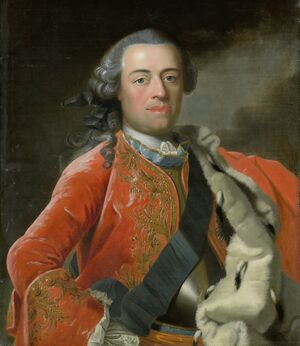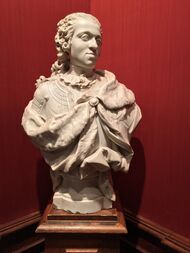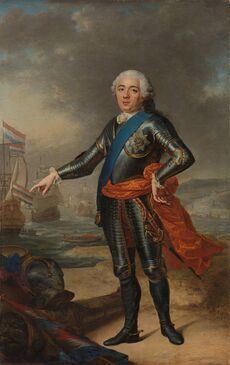وليام الرابع، أمير أورانج
| وليام الرابع | |
|---|---|
 Portrait by unknown artist (1750) | |
| Prince of Orange Prince of Orange-Nassau | |
| العهد | 1 سبتمبر 1711 – 22 أكتوبر 1751 |
| سبقه | John William Friso |
| تبعه | وليام الخامس |
| Stadtholder of the United Provinces | |
| العهد | 4 May 1747 – 22 October 1751 |
| سبقه | وليام الثالث |
| تبعه | وليام الخامس |
| وُلِد | 1 سبتمبر 1711 Leeuwarden, الجمهورية الهولندية |
| توفي | 22 أكتوبر 1751 (aged 40) Huis ten Bosch, لاهاي، الجمهورية الهولندية |
| الدفن | 4 فبراير 1752 |
| الزوج | |
| الأنجال Details... | Carolina, Princess of Nassau-Weilburg Princess Anna William V, Prince of Orange |
| البيت | Orange-Nassau |
| الأب | John William Friso, Prince of Orange |
| الأم | Marie Louise of Hesse-Kassel |
| التوقيع | |
William IV (Willem Karel Hendrik Friso; 1 September 1711 – 22 October 1751) was Prince of Orange from birth and the first hereditary stadtholder of all the United Provinces of the Netherlands from 1747 until his death in 1751.[1] During his whole life he was furthermore ruler of the Principality of Orange-Nassau ضمن الإمبراطورية الرومانية المقدسة.
ارتفعت أصوات معظم الهولنديين مطالبة بزعيم حربي ينقذ البلاد على نحو ما فعل وليم الثالث في 1672، ونصب سليله غير المباشر، وليم الرابع أمير أورانج، حاكماً للأقاليم السبعة، وقائداً للجيش، وأميراً للبحرية (3 مايو 1747)؛ وفي أكتوبر جعلت هذه المناصب وراثية في أسرته، ومعنى ذلك أن الملكية أعيدت في واقع الأمر، غير أن وليم الرابع كان فيه من التمسك بالخلق المسيحي ما لا يجعله قائداً حربياً صالحاً؛ فلم يستطع أن يعيد النظام إلى الجيوش، وتوالت الهزائم يقفو بعضها بعضاً، وفي معاهدة إكس-لا-شابل (1748) كانت هولندة محظوظة لاحتفاظها بأراضيها سليمة، ولكنها عادت خربة من الناحية الاقتصادية ومات وليم بالحمرة وهو في الأربعين (1751)، وقامت أرملته الأميرة آن-بالوصاية على العرش إلى أن ماتت (1759).
. . . . . . . . . . . . . . . . . . . . . . . . . . . . . . . . . . . . . . . . . . . . . . . . . . . . . . . . . . . . . . . . . . . . . . . . . . . . . . . . . . . . . . . . . . . . . . . . . . . . . . . . . . . . . . . . . . . . . . . . . . . . . . . . . . . . . . . . . . . . . . . . . . . . . . . . . . . . . . . . . . . . . . . .
النشأة
William was born in Leeuwarden, Netherlands, the son of John William Friso, Prince of Orange, head of the Frisian branch of the House of Orange-Nassau, and of his wife Landgravine Marie Louise of Hesse-Kassel (or Hesse-Cassel). He was born six weeks after the death of his father.
William succeeded his father as Stadtholder of Friesland and also, under the regency of his mother until 1731, as Stadtholder of Groningen. In 1722 he was elected Stadtholder of Guelders. The four other provinces of the Dutch Republic—Holland, Zeeland, Utrecht and Overijssel—had in 1702 decided not to appoint a stadtholder after the death of stadtholder William III, ushering the Republic into a period that is known as the Second Stadtholderless Period. In 1747 those four provinces also accepted William as their stadtholder.
الزواج والأطفال
In 1733 William was made a Knight of the Order of the Garter. On 25 March 1734 he married at St James's Palace Anne, Princess Royal, eldest daughter of King George II of Great Britain and Caroline of Ansbach. William and Anne had three children:
- Princess Carolina of Orange-Nassau (28 February 1743 – 6 May 1787), married Karl Christian of Nassau-Weilburg
- Princess Anna of Orange-Nassau (15 November 1746 – 29 December 1746)
- William V, Prince of Orange (8 March 1748 – 9 April 1806)
الحياة اللاحقة
In 1739 William inherited the estates formerly owned by the Nassau-Dillenburg branch of his family, and in 1743 he inherited those formerly owned by the Nassau-Siegen branch of his family.

In 1740, the War of the Austrian Succession broke out. The conflict pitted Austria against France over the issue of whether Maria Theresa had the right to inherit her father Emperor Charles VI's crown. The Dutch Republic sided with Austria in 1747 in order to maintain a buffer zone between itself and France, whereupon French troops invaded the Austrian Netherlands. In a few weeks, Louis XV's troops conquered most of the towns in the Austrian Netherlands where the Dutch had stationed troops under the Barrier Treaty, as well as the most important towns in Zeelandic Flanders. The Dutch Republic was at the time weakened by internal division. The Dutch decided that their country needed a single strong executive, and turned to the House of Orange. William and his family moved from Leeuwarden to The Hague. On 4 May 1747, the States General of the Netherlands named William General Stadtholder of all seven of the United Provinces of the Netherlands, and made the position hereditary for the first time. William first met Duke Louis Ernest of Brunswick-Lüneburg in 1747, and two years later appointed him field marshal of the Dutch States Army, which later led to Louis Ernest serving as one of the regents for William's heir.
William IV was considered an attractive, educated, and accomplished prince in his prime. Although he had little experience in state affairs, William was at first popular with the people. He stopped the practice of indirect taxation by which independent contractors managed to make large sums for themselves. Nevertheless, he was also a Director-General of the Dutch East India Company, and his alliance with the business class deepened while the disparity between rich and poor grew.

William served as General Stadtholder of all the Netherlands until he died of a stroke in 1751 at The Hague.
The county of Orange, Virginia, and the city of Orangeburg, South Carolina, are named after him.
السلالة
| سلف وليام الرابع، أمير أورانج |
|---|
الهامش
- ^ Suzanna van Dijk; Jo Nesbitt (1 January 2004). I Have Heard about You: Foreign Women's Writing Crossing the Dutch Border : from Sappho to Selma Lagerlöf. Uitgeverij Verloren. p. 168. ISBN 90-6550-752-3.
وصلات خارجية
 Media related to William IV, Prince of Orange at Wikimedia Commons
Media related to William IV, Prince of Orange at Wikimedia Commons- قالب:NPG name
وليام الرابع، أمير أورانج فرع أصغر من House of Nassau وُلِد: 1 September 1711 توفي: 22 October 1751
| ||
| نبالة هولندية | ||
|---|---|---|
| سبقه John William Friso |
Prince of Orange 1711–1751 |
شاغر اللقب حمله بعد ذلك William V
|
| ألقاب ملكية | ||
| سبقه John William Friso |
Prince of Orange-Nassau Baron of Breda 1711–1751 |
تبعه William V |
| سبقه Francis Alexander |
Prince of Nassau-Hadamar 1739–1751 | |
| سبقه Christian |
Prince of Nassau-Dillenburg 1739–1751 | |
| سبقه Frederick William II |
Prince of Nassau-Siegen 1743–1751 | |
| مناصب سياسية | ||
| سبقه John William Friso |
Stadtholder of Friesland and Groningen 1711–1747 |
Titles obsolete merger of all stadtholderships |
| شاغر اللقب آخر من حمله [[وليام الثالث]]
|
Stadtholder of Guelders 1722–1747 | |
| Stadtholder of Holland, Zeeland, Utrecht, and Overijssel 1747 | ||
| لقب حديث | General Stadtholder of the United Provinces 1747–1751 |
تبعه وليام الخامس |
قالب:GueldersStadtholders قالب:HollandZeelandUtrechtStadtholders قالب:FrieslandStadtholders قالب:GroningenStadtholders قالب:OverijsselStadtholders قالب:DrentheStadtholders
خطأ لوا في package.lua على السطر 80: module 'Module:Authority control/auxiliary' not found.
- Short description is different from Wikidata
- مواليد 1711
- وفيات 1751
- سياسيون هولنديون في القرن 18
- أمراء أورانج
- Counts of Nassau
- Stadtholders in the Low Countries
- House of Orange-Nassau
- Lords of Breda
- Knights of the Garter
- Burials in the Royal Crypt at Nieuwe Kerk, Delft
- People from Leeuwarden
- Child monarchs
- 18th-century Dutch military personnel
- Dutch military personnel of the War of the Austrian Succession
- Stadtholders of Guelders and Zutphen
- Stadtholders of Frisia